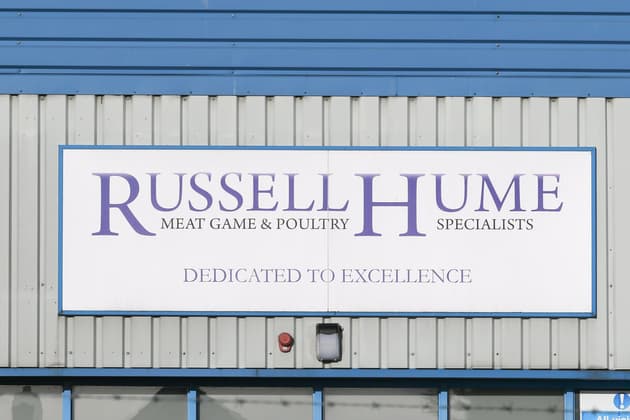
Fear of national meat scandal - thousands of food safety breaches revealed
Many of Britain's meat processing plants and cold storage facilities are failing hygiene standards
More than half of the meat processing and cold storage facilities audited in England, Wales and Northern Ireland had major non-compliances with hygiene or food safety regulations in the last three years. According to data seen by the Bureau of Investigative Journalism, multiple inspections took place at 890 individual premises and inspectors found that 540 of them, or 60.5% had at least one major breach.
We also found that the meat supplier Russell Hume, which was banned from selling any more meat by the Food Standards Agency (FSA) in January and has since gone into administration, had been marked down for 25 major breaches of regulations over the last three years. The firm, which previously supplied restaurants including Jamie Oliver’s Italian and Wetherspoons, reacted to the ban by saying it had an “unblemished reputation”.
A surprise visit by the FSA to Russell Hume’s Birmingham plant had previously revealed “serious non-compliance with food hygiene regulations”. Data seen by the Bureau, in a joint investigation with the Guardian, reveals that audits carried out in Russell Hume factories had highlighted non-compliances at the firm’s meat cutting plants. The audits took place in plants in London, Birmingham, Exeter, Liverpool and Boroughbridge in North Yorkshire between September 2014 and May 2017.
FSA data for a comparable period also suggests that these problems could be endemic in the industry. The Bureau has calculated that most of the meat plants (where meat is prepared and processed into food products) and cold stores (where meat is kept in chilled conditions) inspected from a whole range of suppliers had at least one major non-compliance with hygiene or food safety regulations. The failings are amongst thousands of such breaches documented in these facilities between 2014 and 2017.
Our analysis of the data has revealed 2,600 “major” non-compliances relating to food safety and hygiene regulations during audits carried out at 890 meat cutting plants and cold stores. Many had multiple "major" failings.
A major breach is, by the FSA’s definition, “likely to compromise public health, including food safety... or may lead to the production and handling of unsafe or unsuitable food if no remedial action is taken”.
Breaches found at the Russell Hume meat plants related to multiple aspects of production, including:
- Maintaining legal temperature controls
- Minimising or preventing cross contamination
- Ensuring standards of environmental hygiene
- Monitoring of food safety systems
Make change possible
Investigative journalism is vital for democracy. Help us to expose injustice and spark change
Click here to support usKerry McCarthy MP, who served as shadow secretary of state for Environment, Food and Rural Affairs until 2016, told us that the findings “raise serious questions as to how robust the FSA’s system for monitoring food hygiene really is.”
Kath Dalmeny, the chief executive of the food campaign group, Sustain, told the Bureau: “These figures are truly shocking. Meat products are far too often a cause of risk to our health and a breakdown in trust in the food system.”
She added that she was concerned about the cuts to budgets for bodies that regulate food, including: “our local authority meat hygiene services, independent public analyst laboratories and trading standards inspectors. They doggedly insist on pursuing the flawed notion that ‘light-touch regulation’ is good enough for the meat industry. It simply isn’t. And consumers won’t forgive politicians who choose ideology over safety.”
“All these things are dangerous. Remember, meat is a natural product. It is contaminated sometimes with human pathogens”, said Ron Spellman, who has been a meat inspector for 30 years and who represents the European Association of Food and Meat Inspectors.
Spellman is also specifically concerned about Russell Hume: "What I also find worrying is the attitude of the company...in which they blame the FSA’s handling of the issue... there seems to be no willingness to accept responsibility.”
Got a Story?
We welcome tip-offs from the public and we always protect our sources
Find out how to work with usProfessor Hugh Pennington, a renowned expert in bacteriology, welcomed the fact that inspection staff were discovering issues: “Widespread breaches [are] obviously a bad thing, but their detection shows that the regulatory system seems to be working. In the past outbreaks occurred because the regulators were missing the breaches.”
But he cautioned: “My big concerns would be regarding temperature control failures because these are straightforward to avoid - measurements are simple to make and record and so errors easy to spot and put right.” He added that cross-contamination was particularly important to avoid “to prevent the nastiest bug - E.coli O157 - getting into the food chain.” (Pennington chaired government inquiries into the two most serious outbreaks of E Coli in the UK.)
Our data shows that cross-contamination and temperature controls continue to be a concern. Amongst the overall number of failings identified by FSA auditors in the period we analysed, there were more than 200 major non-compliances relating to maintaining legal temperature controls, and in excess of 300 relating to minimising the risk of cross-contamination.
 Russell Hume depot image
Photograph: Peter Lopeman/Alamy Live News
Russell Hume depot image
Photograph: Peter Lopeman/Alamy Live News
An FSA spokesman told the Bureau: "we carry out thousands of audits and unannounced inspections of meat plants each year to verify the food hygiene standards are being met. Issues which may pose imminent or serious risk to public health will result in immediate and robust enforcement action being taken."
He continued: “each audit assesses almost 50 different hygiene criteria and a single issue can result in multiple major and minor non-compliances being recorded. Only 2% of plants were found to have more than two major non-compliances and the majority had none at all. Where major non-compliances are found follow up audits and unannounced inspections will increase to ensure the issues found have been resolved.”
In a statement, the former directors of Russell Hume Ltd said: “Between 2014-2017 the FSA carried out a number of routine inspections and audits of Russell Hume’s six branches. The audit system is specifically designed to highlight areas for improvement, and inevitably there were a small number of recommendations over this period that required action. But these averaged around one a year per branch, and taken together and in the context of industry practice as a whole, the audit results were positive for Russell Hume. The company has never been prosecuted for food safety or hygiene offences, and saw no FSA enforcement action taken against it over this period.”
There is growing anxiety that the problems in the meat industry may be wider than initially thought. Four different companies have now withdrawn meat, and the FSA has also set up a national review of meat processing plants. This week the agency met with meat industry heads to discuss the situation, for a discussion that was apparently “constructive and engaging”.
In the House of Commons this week shadow secretary of state Barry Gardiner MP asked Liam Fox MP, secretary of state for international trade, whether he was aware that the FSA had recently detained large quantities of out of date meat in a cold store company. Gardiner said the meat was believed to come from Ireland and South America and that one of the companies he named had been implicated in the Irish horsemeat scandal of 2013 and had previously been found guilty of meat labelling fraud. He asked that the secretary of state “urgently liaise with ministers in the Republic, with the FSA here and with the Irish Food Safety Authority” to look at the supply chain.
“Failure on this scale can’t be attributed to just a few rogue businesses falling through the cracks,” said Kerry McCarthy MP, adding: “Consumers need to have confidence in the system and need to know that action is being taken against companies with incidents of major non-compliance.”
Header image, of a stock-shot of supermarket meat, via Shutterstock




